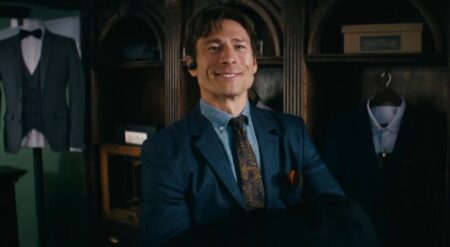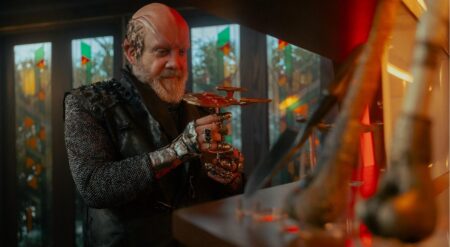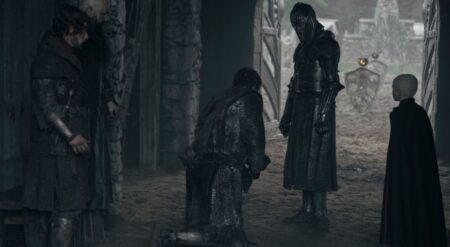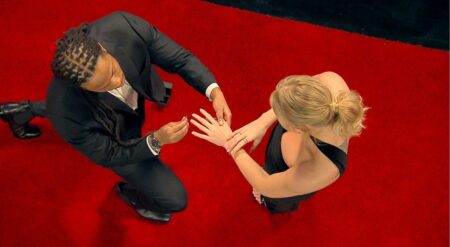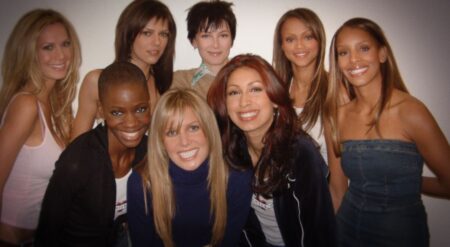Warrior, the new Cinemax series based on the writings of Bruce Lee, has had a powerful season one so far. As it closes in on its season finale the show is upping the action anty and setting up politics, war, and more in episode eight, “They Don’t Pay Us Enough to Think.”
Opening with one of the shots of the season one trailer (featured above) that pulled me into the show, the Hop Wei framed by the sides and hatchets of the Long Zii, we get a scene that highlights the action star talents of Andrew Koji as Ah Sahm, Jason Tobin as Young Jun, and Joe Taslim as Li Yong. As the Hope Wei and Long Zii murder each other in the street, the credits begin to play and the tone for “They Don’t Pay Us Enough to Think” is set.
After a bloodbath on the streets of Chinatown, the white politicians of San Francisco are pushing the Asian Exclusion Act harder than before. Like any good period piece, Warrior has repeatedly pulled the racism that the Chinese immigrants and Chinese Americans in the city face, contextualizing their lives and story in the realities of the period. While the Exclusion Act has been mentioned in previous episodes, in “They Don’t Pay Us Enough to Think” we see it pushed even further. It’s reality closing in on our characters as the racist politicians use the recent violence to justify the Act’s existence.
If you’re unaware, Warrior has been giving viewers a slow history of the racist law, that was signed into law in 1882, created to target Chinese immigrants and Chinese-Americans in the United States. It prohibited all immigration of Chinese laborers, building on the Page Act, which banned Chinese women from immigrating to the United States and was passed in 1875. The Chinese Exclusion Act was the first law implemented to prevent all members of a specific ethnic or national group from immigrating. The language used to describe the Act, and the Chinese community in San Francisco is familiar racism and a brand that is still being used to vilify and criminalize Latin American immigrants today.
This ugly piece of American History is at the center of the story for the upper class ducks, what the citizens of Chinatown call white San Franciscans. In the series, while the working-class ducks, specifically the Irish are shown as fighting over work and implementing their racism through actual violence instead of the systemic violence perpetrated at the top. All while Lee and Bill ride the line in-between the two.

In “They Don’t Pay Us Enough to Think,” the danger that the Tong War poses to Chinatown is clear. With violence in the open, it causes the ducks to worry. If they worry, they send cops. If they send cops, it’s the people of Chinatown who will suffer, not the Tongs. This leads the leader of the Chinatown Business Association to call a parlay between the Hop Wei and the Long Zii. When the two accept, Father Jun and Mai Ling meet on neutral ground. While Father Jun is aware that Mai Ling has been the leader of the Tong even before her husband’s death, he shows her less respect than her husband received.
Not only does this meeting showcase the first meeting between Father Jun and Mai Ling, positioning the latter as a legitimate boss, it also offers a surface looking into the dynamic between both Juns. While Father Jun is aiming to let the Long Zii show their throat, Young Jun is looking for blood, he’s itching for more fighting, but refreshingly, Father Jun values the lives of his men more than winning a battle.
Instead of continuing the fighting in the open, the two Tongs agree to a novel idea: one fighter each, for the right to the Opium trade, and specifically for peace or for war. Although we haven’t seen much of him outside of his stoic appearance next to Mai Ling, Li Yong is the choice to represent the Long Zii. The best fighter they have and also one who wants this one versus one match to succeed in order to spare a betrayal from the Fung Hai in the future.
For the Hop Wei, Ah Sahm is chosen upon Young Jun’s recommendation and dispatching a room of Hop Wei fighters to prove himself in front of Father Jun. Although it may mean fighting his sister’s Tong, it quickly becomes clear that defeating her might be the only real way to save her.
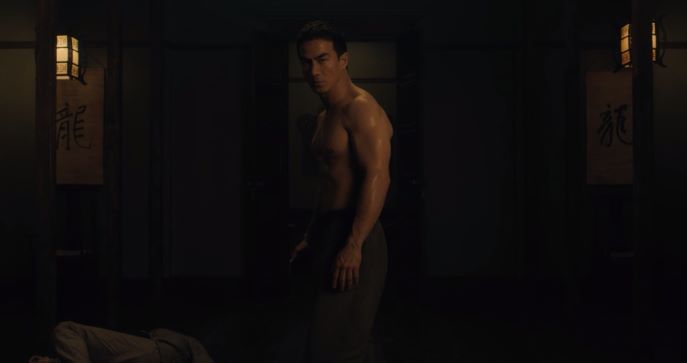
In “They Don’t Pay Us Enough to Think,” we get a first real look at Li Yong’s ability. While he is shown sparring with his shirt off, it would be easy to just see him as yet another attractive member of an extremely attractive cast, but watching him train, his athleticism is on full display. It’s a raw representation of his dedication and ability to win and the first real threat that Ah Sahm will face this season.
Not only do we see the execution of great fight choreography and therefore see his character’s skill but we also see that Taslim has trained his body to do this. It’s common sense that he has the skill but there is something exciting and special to see his muscles move under his skin as he performs the moves. This is expanded when we see a montage of both Li Yong and Ah Sahm training for their impending battle.
The training montage is undefeated, with Ah Sahm practicing on the mu ren zhuang, the wooden dummy used in martial arts training. While Li Yong opts for sparring and using hot sand to toughen his hands, also used in martial arts as a form of conditioning. These two fighters are entering the arena as the strongest as the sequence heightens the tension and anticipation of the duel happing next episode.
Overall, “They Don’t Pay Us Enough to Think” showcases the actors’ ability as fighters while deepening the story of Chinatown as it is defined by the Tongs, its own culture, and unfortunately at the mercy of the impending Exclusion Act. In this episode, the impending doom of racist legislation and the duel to end the Tong War pulls the viewer in and keeps them seated, ready for the last two episodes of the season.
Warrior is available now on MAX (formerly HBO Max) and Netflix.
Warrior, Episode 8 - They Don't Pay Us Enough to Think
-
Rating - 10/1010/10
TL;DR
“They Don’t Pay Us Enough to Think” showcases the actors’ ability as fighters while deepening the story of Chinatown as it is defined by the Tongs, its own culture, and unfortunately at the mercy of the impending Exclusion Act.


